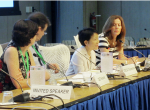The Global Environment Facility (GEF) Council consultation meeting with civil society organizations (CSOs) gathered approximately 100 participants to focus on three topics: a dialogue with the GEF CEO; strengthening CSO engagement in the GEF; and knowledge management in the GEF.
Just after the close of the consultation, the first meeting of the new Working Group on Implementation of the GEF Public Involvement Policy (PIP) convened, involving members of the GEF CSO Network, the GEF Secretariat and the GEF Council.
The day-long CSO Consultation took place immediately before the 48th meeting of the GEF Council, which will convene at the same venue from 2-4 June 2015.
 1 June 2015: The Global Environment Facility (GEF) Council consultation meeting with civil society organizations (CSOs) gathered approximately 100 participants to focus on three topics: a dialogue with the GEF CEO; strengthening CSO engagement in the GEF; and knowledge management in the GEF. Just after the close of the consultation, the first meeting of the new Working Group on Implementation of the GEF Public Involvement Policy (PIP) convened, involving members of the GEF CSO Network, the GEF Secretariat and the GEF Council. The day-long CSO Consultation took place immediately before the 48th meeting of the GEF Council, which will convene at the same venue from 2-4 June 2015.
1 June 2015: The Global Environment Facility (GEF) Council consultation meeting with civil society organizations (CSOs) gathered approximately 100 participants to focus on three topics: a dialogue with the GEF CEO; strengthening CSO engagement in the GEF; and knowledge management in the GEF. Just after the close of the consultation, the first meeting of the new Working Group on Implementation of the GEF Public Involvement Policy (PIP) convened, involving members of the GEF CSO Network, the GEF Secretariat and the GEF Council. The day-long CSO Consultation took place immediately before the 48th meeting of the GEF Council, which will convene at the same venue from 2-4 June 2015.
The CSO Consultation took place on Monday, 1 June 2015, at World Bank headquarters in Washington, DC, US.
On CSO engagement, speakers discussed CSO engagement frameworks in several different organizations. For example, Delfin Ganapin, GEF SGP, highlighted a role for building the legitimacy of CSOs, noting that their advocacy work will be enhanced if they have experience with implementation. He introduced new initiatives, including “Communities Connect” (CC+), fellowship initiatives, and “Grantmaker+,” and said the objective is to move beyond ad hoc consultations to work with CSOs as direct implementers. Fiu Elisara, Ole Siosiomaga Society Incorporated, discussed CSO engagement in Climate Investment Funds (CIF). He said the designated CSOs who participate in CIF are called “observers,” but they are able to contribute to the discussions on agenda items. He said there is no funding for CIF observers to engage with their own constituencies. And Liane Schalatek, Heinrich Böll Foundation North America, discussed CSO engagement in the GCF, noting that there are only two CSO observers and two private sector observers, one from the North and one from the South for each category. She said there are small, issue-based groups that are trying to engage with the Secretariat, but there is no formal consultation process. She said the GCF should consider a SGP-type program.
On knowledge management, Martin Sneary, IUCN, said ICUN had found that in order for KM to succeed, one needs to make information easily available to the people who need it, when they need it, in a way that is easy to consume, in a context that is relevant to them, using language that resonates with their own work, and in a manner that instills confidence that the information is accurate and reliable. Dominique Kayser, World Bank, discussed the Bank’s evolution from a “knowledge bank” to a “solutions bank” with regard to knowledge, noting that the Bank is now focusing more on connections and application of knowledge. She highlighted the value of incentivizing and nurturing efforts to move tacit knowledge “upwards” to make it more explicit in data, information, documents, records and files. Ana Maria Curreau, GEF SGP, discussed SGP’s KM efforts, including its Communities Connect+ concept. She said KM in SGP is about the communities keeping the know-how of a topic alive by sharing what they know, building on it and adapting it to their own use. And Mrinalini Rai, Global Forest Coalition/IPAG, said indigenous and traditional knowledge (TK) should be better researched, recognized and applied, but the KM system should include repositories of lessons, case studies, and best practices while respecting intellectual property rights for TK. She also said indigenous peoples should participate in the proposed interagency KM working group. [IISD RS Coverage of GEF Council Consultation with CSOs]